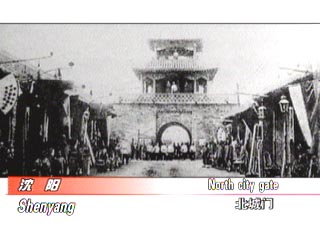 |
|
Evening Drum and Morning Bell (4)
Japan-Russia War  |
| CCTV.COM 2002-06-22 11:06:25 |
|
 Lushunkou was situated at the southernmost part of Liaodong Peninsula. For the past century and more it was a strategic place of military contention. On Feb. 8, 1904, 8 days before Spring Festival, the people were in a festive atmosphere. All of a sudden Japanese gunfire bombarded a Russian fleet anchored at Lushunkou. Thus, Japan-Russia War started. Lushunkou was situated at the southernmost part of Liaodong Peninsula. For the past century and more it was a strategic place of military contention. On Feb. 8, 1904, 8 days before Spring Festival, the people were in a festive atmosphere. All of a sudden Japanese gunfire bombarded a Russian fleet anchored at Lushunkou. Thus, Japan-Russia War started.
The Northeast was the place where Qing Empire originated. The Qing government had always prohibited immigration to their sacred ancestral land. Since the beginning of the 20th century, poor peasants from Shandong and Hebei provinces started a tide of seeking a livelihood in the Northeast. They began to settle down on the land of fertile black earth outside the Great Wall.
 This was Shenyang in the beginning of the 20th century. The photo shows a thriving Northeast. Neighboring Russia had long coveted the land. They had not only occupied a large stretch of this land since the 40s of the 19th century but were waiting to monopolize the entire Northeast. On the other side of the sea, Japan harbored ambitions too. In the beginning of the 20th century, with indemnities from China, Japan opened mines and set up factories to plunder resources in the Northeast and mapped out a 10-year expansion plan. When Russia threatened its interest, a war was bound to break out. This was Shenyang in the beginning of the 20th century. The photo shows a thriving Northeast. Neighboring Russia had long coveted the land. They had not only occupied a large stretch of this land since the 40s of the 19th century but were waiting to monopolize the entire Northeast. On the other side of the sea, Japan harbored ambitions too. In the beginning of the 20th century, with indemnities from China, Japan opened mines and set up factories to plunder resources in the Northeast and mapped out a 10-year expansion plan. When Russia threatened its interest, a war was bound to break out.
Japan-Russia War started in Lushun spread rapidly to the entire Liaodong Peninsula. On Feb. 12, the Qing court proclaimed neutrality and delineated an area as the battlefield, allowing the two countries to fight on its territory. A sovereign state turned itself into an onlooker. The war continued until 1905 with Japan gaining one victory after another. After Japan’s occupation of Lushunkou, it routed Russia’s main force at Liaoyang. The defeat aggravated the turbulent political situation in Russia and triggered a bourgeois revolution in l905. Tsarist Russia had to carry out a constitutional reform. The sudden rise of Japan startled the entire world. 10 years ago, it defeated Qing Empire on the sea, now it conquered a powerful country in Europe. Thereafter, Japan had always controlled the southern part of Northeast China and became a hegemonic country in East Asia.
 The result of the War had a great impact on China. People were jolted and inspired by the rise of Japan after its constitutionalism. Qing-dynasty ministers, represented by viceroys Cen Chunxuan and Zhang Zhidong, clamored for the Qing government to carry out constitutional reforms. When the War ended in Sept. l905, the casualties of the two countries were only 100,000 while three times that many poor Chinese were killed. Japanese army reporters took many pictures and showed slide in Japan. This pained Lu Xun who was studying in Japan. He decided to end his studies of medical science and took up literature instead. From then on he embarked on a road of enlightening his countrymen. The result of the War had a great impact on China. People were jolted and inspired by the rise of Japan after its constitutionalism. Qing-dynasty ministers, represented by viceroys Cen Chunxuan and Zhang Zhidong, clamored for the Qing government to carry out constitutional reforms. When the War ended in Sept. l905, the casualties of the two countries were only 100,000 while three times that many poor Chinese were killed. Japanese army reporters took many pictures and showed slide in Japan. This pained Lu Xun who was studying in Japan. He decided to end his studies of medical science and took up literature instead. From then on he embarked on a road of enlightening his countrymen.
Ruins of the War are still preserved in Lushun. These foreign monuments erected in China are silent evidences of the shame and weakness of a nation in the beginning of the 20th century.
|
|
|
|
|
|
|
 |









